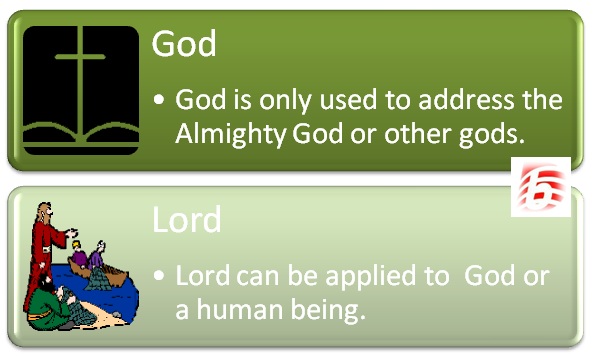The key difference between God and the Lord is that the word God is only used to address the creator and ruler of the universe: the supreme being, or one of several deities while the word lord can be used to describe a god or a human being.
The two words God and Lord are used interchangeably at times, especially in the religious sense. Therefore knowing the difference between God and Lord becomes very important. Both the words God and Lord are nouns. According to the Oxford English dictionary, God is “(In Christianity and other monotheistic religions) the creator and ruler of the universe and source of all moral authority; the supreme being.” As a word, it seems to have a Germanic origin. God is, in fact, a word that is much connected with the English language as there are many phrases that are used every day with the word God in them. For example, for God’s sake, God bless, etc. On the other hand, the religious definition of Lord is ” (Lord) a name for God or Christ.” It also carries the meaning “master or ruler.”
What does God mean?
The word god basically has similar two meanings. According to monotheistic thought, God is the supreme being, creator of the world and the principal object of faith. God is believed to be omnipotent (all-powerful), omniscient (all-knowing), omnibenevolent (all-good) and omnipresent (all-present).
However, polytheistic religions believe in many gods. For example, Hinduism is a polytheistic religion. When one writes the word god with a capital G, as in God, that refers to the almighty God believed in Christianity. God with simple g is used for other gods. For instance, the god of death, the god of love, the god of wealth, etc. In some instances, you would find mythological beings too referred to by the word god.
What does Lord mean?
The word lord, on the contrary, has the meaning ‘the one who rules over the others’. Hence, this word can be applied to God or human beings. In short, any human being who has the ability to rule over others can be called a lord. For example, a king of a kingdom is addressed as ‘lord’ by his ministers and subjects.
England too had lords who ruled over other jurisdictions. The usage ‘lord of Israel’ was coined by the Jews way back in 3rd century BC to refer to the ‘god of Israel’. In fact, they used the term, ‘ Adonai’ to be more precise. The word ‘Adonai’ means ‘lord’ in Hebrew. This is perhaps the reason translators used the word ‘lord’ wherever there was the use of the proper name of God in the Hebrew language while translating the Old Testament.
The word ‘lord’ is used in other senses too. In some countries, it is used to address the head of the judiciary or the judge. In the mythologies of a few countries, it is used as a prefix of any god for that matter. Sometimes the word is used as a mere title too.
Key Takeaways
- The key difference between God and the Lord is that the word God is only used to address the almighty God or other gods while the lord can be used to describe a god or a human being.
- When one writes the word god with a capital G, as in God, that refers to the almighty God believed in Christianity. God with simple g is used for other gods.
- The word lord can refer to both a god or a human ruler, and is sometimes used as a title or prefix for gods in certain mythologies.
What is the Difference Between God and Lord?
The key difference between God and the Lord is that the word God is only used to address the almighty God or other gods while the lord can be used to describe a god or a human being. When one writes the god with a capital G, as in God, that refers to the almighty God believed in Christianity. God with simple g is used for any other god. In some countries, the word Lord is used to address the head of the judiciary or the judge. Lord is sometimes used as a mere title too. In the mythologies of a few countries, the word Lord is used as a prefix of any god for that matter.
Summary – God vs Lord
The key difference between God and the Lord is that the word God is only used to address the almighty God or other gods while the lord can be used to describe a god or a human being. These two words are used interchangeably at times, especially in the religious sense.
